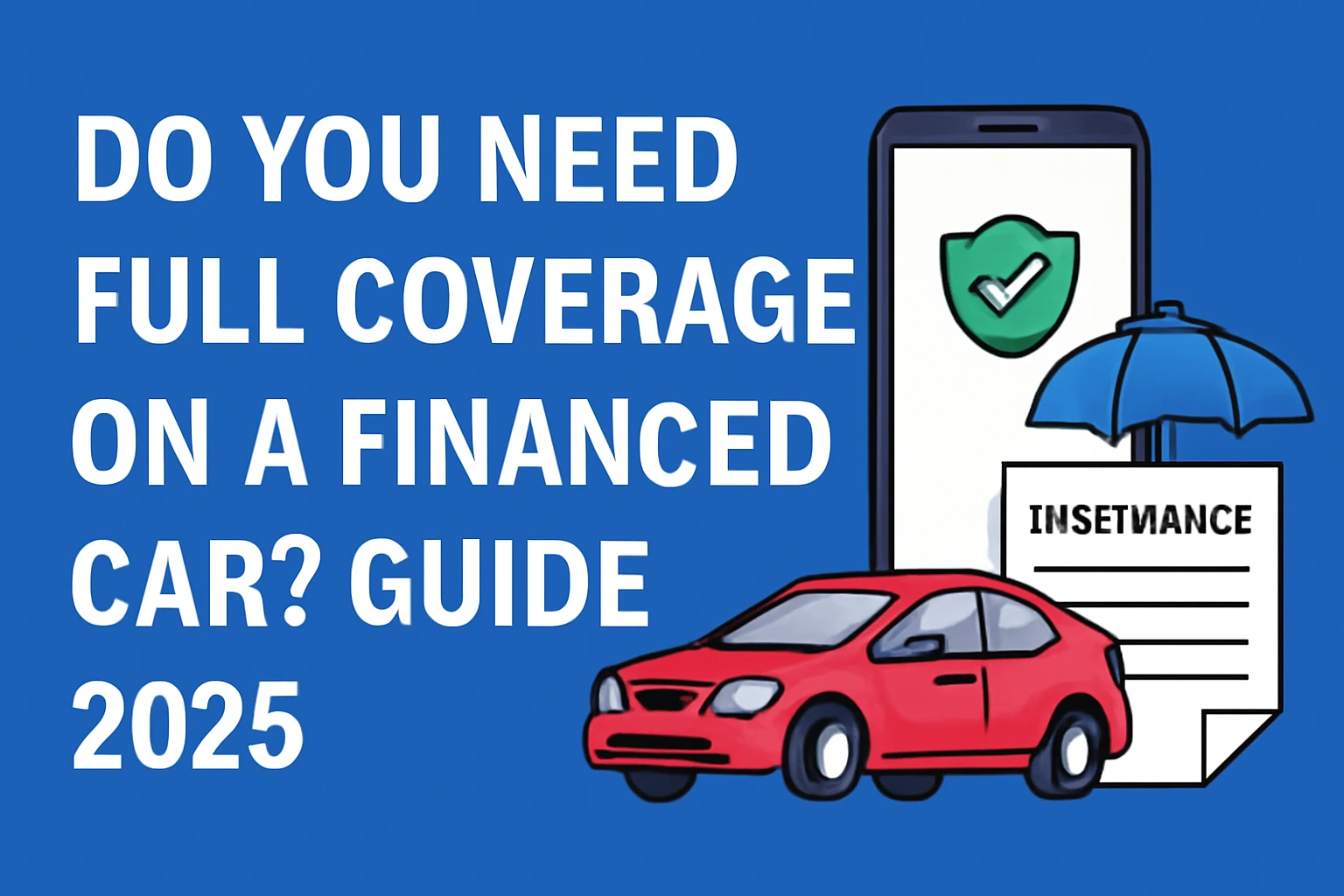Introduction – Do You Need Full Coverage on a Financed Car?
Buying a financed car often raises a common question: do you need full coverage on a financed car? Lenders usually want assurance that their investment stays protected, which is why coverage requirements go beyond basic liability insurance. Whether it’s a new or used financed car, full coverage insurance provides financial security if the vehicle is damaged or totaled. According to lenders, having comprehensive coverage is vital when you apply for financing. allworldwidenews.com, securing proper insurance not only meets lender rules but also safeguards drivers from unexpected repair and replacement costs.
What Is a Financed Car and Why Does It Require Coverage?
A financed car is a vehicle purchased through an auto loan where the lender holds rights to the title until payments are complete. Because the lender is technically part-owner, they require proof of insurance to protect their investment throughout the finance period. Coverage on a financed car usually goes beyond minimum liability insurance and often includes comprehensive and collision coverage. Without proper protection, lenders may impose force-placed insuranceFull insurance coverage, which is costlier and offers limited benefits, is often required by lenders when you apply for financing.
Key reasons lenders require coverage:
- Protecting the lender’s investment is crucial when you finance a used car.
- Meeting state insurance requirements is essential when you apply for financing and obtain a loan for a financed car.
- Avoiding force-placed insurance
Understanding Full Coverage Insurance
What Does Full Coverage Include?
Full coverage on a financed car is more than liability insurance. It combines different protections that lenders often require to safeguard the vehicle during the finance period. Standard full coverage car insurance typically includes collision and comprehensive insurance:
- Liability insurance You are liable for damage or injuries to others, which is why lenders often insist on full insurance coverage.
- Collision coverage for accidents involving your car
- Comprehensive coverage is a key component of full coverage car insurance that lenders often require. for theft, fire, or natural disasters
- Uninsured motorist coverage is an essential part of the insurance coverage you need for a financed vehicle. to protect against uninsured drivers
- Medical payments coverage for treatment costs after an accident
Minimum Coverage vs. Full Coverage
| Coverage Type | Minimum Coverage (State Law) | Full Coverage (Financed Car) |
|---|---|---|
| Liability Insurance | ✔ Required | ✔ Included |
| Collision Coverage | ✘ Not Required | ✔ Required |
| Comprehensive | ✘ Not Required | ✔ Required |
| Uninsured Motorist | Optional in some states | Often Included |
| Medical Payments | Optional | Often Included |
Do You Need Full Coverage on a Financed Car?
If you’re asking do you need full coverage on a financed car, the answer is almost always yes. Lenders require full coverage insurance because it ensures their financial stake is protected for the entire loan term. A financed car is still legally tied to the lender, so the insurance coverage you need is more than just liability insurance alone. Without comprehensive and collision coverage, the lender risks losing money if the vehicle is totaled or stolen. Skipping full coverage can also result in costly force-placed insurance, higher monthly payments, or even repossession if proof of insurance isn’t maintained.
Insurance Requirements for a Used Financed Car
Coverage on a Used Financed Car
When financing a used vehicle, lenders generally still require full coverage insurance. A used financed car may have a lower market value than a new one, but lenders want assurance that their investment is protected. Car insurance costs for used cars are usually cheaper because replacement and repair values are lower, yet coverage on a used financed car remains necessary throughout the loan term.
Full Coverage on a Used Financed Car
Even if the car is older, lenders often insist on full insurance coverage when you finance a used car. full coverage on a used financed car. Comprehensive and collision coverage safeguard against accidents, theft, and natural disasters, ensuring the lender’s loan balance is secured.
Additional Insurance Options Lenders May Require
Gap Insurance
Lenders often recommend or require full insurance coverage when you apply for financing. gap insurance on a financed car, especially if the loan balance is higher than the car’s market value. Gap coverage pays the difference between what your insurance covers and what you still owe if the vehicle is totaled, which is important when you finance a used car. For many used financed cars, this protection helps both the borrower and the lender avoid financial loss.
Force-Placed Insurance
If you allow your coverage to lapse, the lender may purchase force-placed insurance on your behalf. This option is usually far more expensive, provides limited protection, and ensures the lender’s investment is covered, but it doesn’t fully protect the driver.
How Long Do You Need Full Coverage on a Financed Car?
Comprehensive insurance is generally required for the entire finance period, meaning until the loan is completely paid off. Since the lender holds rights to the vehicle’s title, they demand proof of insurance at all times. Whether you’re financing a new or used car, dropping coverage before the loan ends can result in penalties or force-placed insurance. Maintaining comprehensive and collision coverage throughout the finance term ensures both the lender and borrower remain financially secure if the car is damaged, stolen, or totaled during the repayment period.
Tips for Managing Insurance on a Financed Car
Keeping insurance on a financed car affordable while meeting lender requirements takes planning. Borrowers should explore different The insurance policy you select should include collision and comprehensive insurance to meet the need for a financed car. options to balance coverage and cost. While full coverage insurance is often mandatory, smart choices can reduce expenses without risking protection.
- Compare insurance providers regularly to find competitive rates and better coverage options.
- Bundle policies to save money, such as combining auto insurance with home or renter’s coverage.
- Ask lenders about minimum requirements so you understand exactly what insurance is necessary during the finance period and avoid paying for coverage you don’t need.
Jobs in Technology and Financing
Managing insurance coverage while financing a car highlights how financial decisions shape long-term stability. Just like choosing the right protection plan safeguards your investment, exploring career opportunities can secure your future income. The technology sector, in particular, is rapidly expanding and offers strong potential for financial growth. To understand the outlook, check this detailed guide on how many jobs are available in technology in 2025. Smart choices in insurance and career keep you protected today and secure tomorrow.
FAQs – Do You Need Full Coverage on a Financed Car?
What happens if I don’t get full coverage on a financed car?
If you skip full coverage insurance, the lender may add costly force-placed insurance or even repossess the financed car due to lack of required protection.
Do lenders always require full coverage insurance?
Yes, most lenders demand full coverage on a financed car to safeguard their loan balance until repayment is complete.
Can I drop full coverage once the loan is paid off?
After completing the finance period, you can switch to liability insurance or other coverage options based on state laws.
Is gap insurance mandatory for financed cars?
Not always, but many lenders strongly recommend gap insurance if the loan amount exceeds the car’s market value.
Does a used financed car need full coverage insurance?
Yes, lenders usually require full coverage on a used financed car just like on a new vehicle.
What’s the difference between liability and full coverage on a financed car?
Liability insurance covers damage to others, while full coverage insurance adds collision and comprehensive protection for your vehicle.
How long do I need full coverage when financing a car?
You need full coverage car insurance for a financed car. full coverage insurance for the entire finance period until the loan is fully repaid.
What if my lender buys force-placed insurance for me?
Force-placed insurance is expensive, limited in benefits, and only protects the lender, not you as the driver.
Conclusion – Why Full Coverage Matters on a Financed Car
When financing a car, full coverage insurance is more than just an option—it’s often a lender requirement. Whether you’re financing a new or used vehicle, having full coverage ensures both you and your lender are financially protected. Without it, you face risks such as loan default, repossession, or paying out of pocket after an accident.
Remember, while liability coverage meets state minimums, it doesn’t fully safeguard a financed car. It meets lender rules and gives peace of mind during the loan term.














